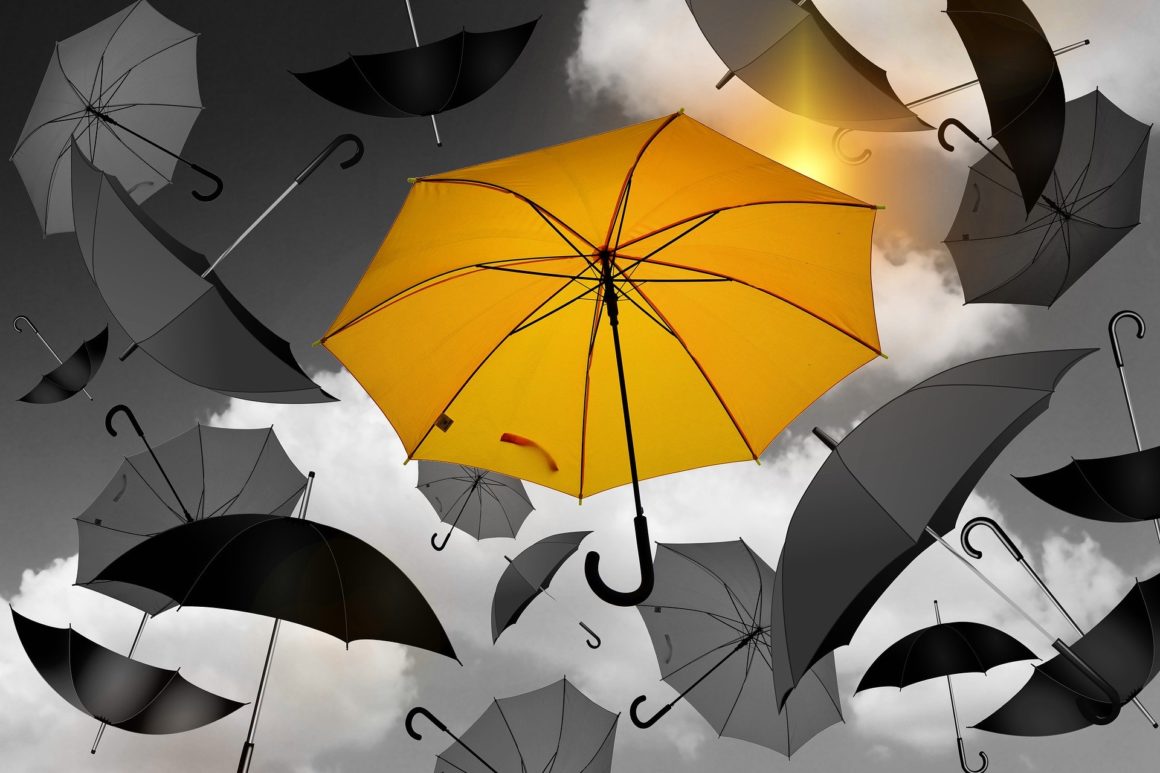
The Sky is Falling: Here’s an Umbrella
so much depends
upon
a red wheel
barrowglazed with rain
waterbeside the white
chickens– William Carlos Williams, “The Red Wheelbarrow”
Many months ago, my son’s orthodontist suggested “tongue therapy.”
We didn’t know such a thing existed, but he explained to us that after wearing a palette expander (a torture contraption familiar to me) and over a year of braces, my son’s tongue would eventually push his teeth out of place again.
The simple way his tongue moved in his mouth when he ate, swallowed and breathed would wreak havoc.
All of that hard work (and hardware) would eventually be for nothing.
Well, maybe he didn’t say all that (he’s much more easygoing, much less dramatic), but as he explained all the things one’s tongue affects, that’s how I heard it.
As an HSP, I am often aware of small things; how they spin into threads, weave themselves into much larger things.
But I’ll admit, this tongue thing surprised me.
I hadn’t even considered the tongue before.
Fast forward, and it’s March.
Suddenly, one large thing overshadows every other thing—the elephant in the room, the thing none of us can get out of our minds no matter how hard we push it around inside us. One thing we had never considered a serious threat before—a virus. COVID-19.
We usually don’t consider viruses at all until we have one, when we’re laying on the couch wondering “how did I wind up on this couch, and why do I feel so miserable?”
While we can consider the tongue and instantly identify the ways having one benefits us, we don’t do the same with viruses. We know viruses cause havoc, and we certainly can’t see them doing us any good. Especially this one.
But the strange truth is, viruses can be “important beneficial microbes in human health and agriculture,” as researchers point out in this 2015 study.
Another strange truth is that tongues can also wreak havoc—so says my son’s orthodontist, and now his tongue therapist. Who knew?
A couple of weeks ago, my son had his first appointment with the tongue therapist.
After almost a year of forgetting about the tongue and what the orthodontist said, we dug out the business card, and I called.
After she leaned into Zoom to stare at his teeth, at his smile, and that tongue, the passionate and friendly therapist gave us a list of exercises.
Small, controlled movements my son could do twice a day for just a few months that would teach his tongue what its role is, what it needs to do.
Small, controlled movements. Long-term benefits. And those benefits would help not only his teeth, but his breathing, his sleep, and his overall health.
She sent us the list of these small movements. Numbered, orderly, with precise instructions.
All we had to do was take control, follow the list.
Twice a day, at least. And for just a few months. And then…?
My son would master his tongue, that tongue would be controlled, and all would be well.
We like to think we can master things, control them, and all will be well.
Corona-virus, if it has taught us anything, teaches us some things can’t be controlled.
That sometimes we don’t have any answers. That mastery, if it is possible at all, will take a long, long time.
That all—no matter how much we wish it were so—may not be well.
Despite all this, many have tried to give us answers, a sense of control. Sure, we have orderly lists telling us how to “shelter in place” during this pandemic.
But how many articles, news segments, YouTube videos, Facebook, Twitter, and Instagram posts have given us numbered, orderly lists that tell us how to master this unique opportunity?
How many times have you been told that you can use this time of social distancing, of isolation (of death and grief and apocalyptic overwhelm) to re-order your life, re-prioritize, discard what doesn’t serve?
How many times have you thought, “My God, I can’t even figure out what to make for dinner and you want me to find my purpose?”
No matter how much we want to control things, no matter how many answers we want (and how badly we want them), there is no numbered, orderly list we can follow to master this.
There are no precise instructions that (if followed twice a day, at least) will help us deal with this, and then all will be well.
Scientists, if given enough time, may give us vaccines.
But there’s not an injection or pill for what we’re going through right now.
This is why I struggle to write HSP articles. I don’t feel like I can give you “10 steps” to feel OK, or write you a “List of Effective Ways to Manage Stress.”
I am not a therapist; not even a tongue therapist. I stink at figuring out what’s for dinner at my house, much less what existential questions to tackle next.
And, if I’m honest, I haven’t been using this social-distancing time to re-prioritize my life, to become a full-time creative genius, or to get better at meal planning.
Like most people, and like most HSPs I know, I’ve been overwhelmed by the apocalyptic turn the world has taken, the enormity of the situation, and how little I can do.
Like most people, and like most HSPs I know, I’ve been doing little things—gardening, writing, reaching out to friends—to make meaning out of this chaos.
But, like 99% of the people out there, I’m floundering around from day to day, sometimes finding what matters, sometimes just finding the bag of chips I hid from the kids and binge-watching Netflix.
I’m doing what we all do, even on a “normal” day: sitting hunched under a very small umbrella gazing at the one thing that (for just a little while longer) keeps the sky from falling.
Sometimes that one thing is something rich and deep; sometimes it’s something bittersweet; sometimes, it’s just a snack and bad TV. But you get the idea.
Highly-sensitive people (HSPs) live in a world of complexity. We notice the big things as well as the very small all at once.
We see how the huge connects to the tiny, and where there are disconnects, discord.
We “see” with all of our senses, “feel” at all levels (intellectual, emotional, spiritual, existential), and often can’t explain any of this to others.
Life isn’t simple, and we know it.
All of these things are too big to tackle—too big for me, for you, for any of us, HSP or not.
No list I can give you, no article I can write here, will give you the perfectly numbered steps to take on this crazy journey.
In this life, all I can do is invite you under my very small umbrella and show you the one tiny thing on this one particular day that kept my sky from falling.
This one small thing could be a poem by William Carlos Williams, a conversation with my son, making frozen pizza for dinner.
But I hope that these small things—shared from the deepest part of my heart—let you know that we’re all holding up our small umbrellas, staring at something ordinary and meaningful, trying to make sense of the world.
More than any list I could write for you, I hope that by sharing these small moments of my life I can help connect you to something deep within you, something meaningful.
Something larger than any one umbrella.
Something like the wondrous expanse of sky above us all: a sky that never falls, even when we’re convinced it will, at any moment.
An addendum: I wrote this article right before the death of George Floyd, and prior to the mass demonstrations for Black Lives Matter spread across the country.
The pandemic of racism is just as dangerous as this virus.
And I realized that for all people of color, seeing a “wondrous expanse of sky…that never falls” is impossible while carrying the weight of oppression.
My offer of an umbrella in this article seems small now.
But I am hoping that as thousands of people raise protest signs together, and as we all begin to see the landscape more clearly, we can begin to create an umbrella large enough to help carry that weight.
And maybe, eventually, we can hold up the sky for each other.
As you wrestle with these issues, can you can share what’s getting you through this time? What’s under your umbrella?





